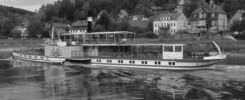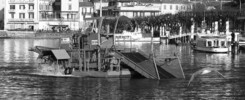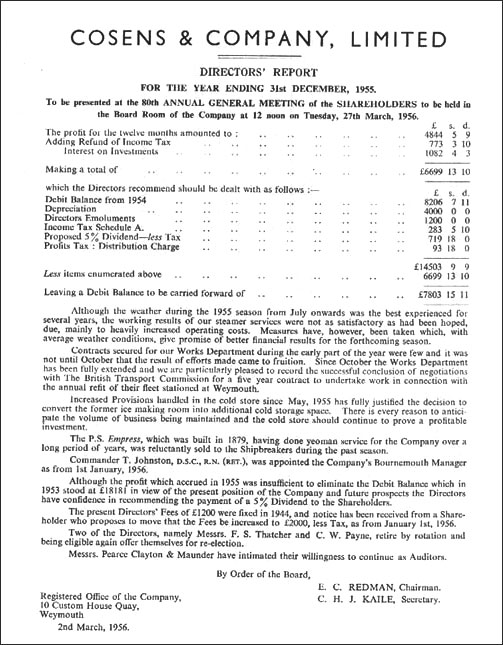
Capt Cosens started running paddle steamers from Weymouth in 1848. On 10th June 1876 Cosens and Company was incorporated as a limited company. The notes below, taken from the Directors’ reports in the 1950s and 1960s, make fascinating reading and give an insight into the vagaries of running paddle steamers and trying to keep them solvent in the post war period.
Season 1949
Extract from the Directors’ Report dated 27th February 1950
All the company’s steamers were employed during the past Season but, notwithstanding the fine weather, the increased working expenses and diminished spending power of the public had an adverse effect on the revenue derived therefrom.
There was a falling off in Contract Ship Repairs affecting the Works Department and competition in this area is increasing.
Your Directors are going carefully into the question of working costs with Revenue. No efforts will be spared in trying to find a satisfactory solution to post-war problems.
The Cold Storage Department remains under the control of the Ministry of Food.
Owing to the age of the PS Monarch (built in 1887) and the high cost of reconditioning, the Directors have reluctantly come to the conclusion that this fine old vessel must be sold to the ship-breakers. She has a wonderful record of service to the Public, and throughout two World Wars, and much regret will be felt at her passing. It is not proposed to replace her whilst costs remain at their present high level.
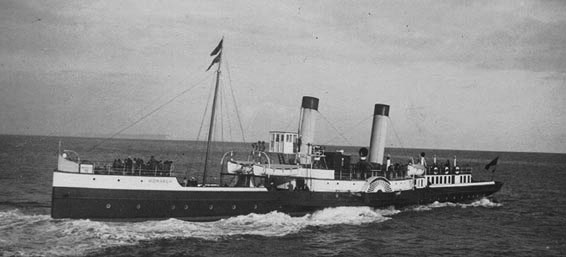
Season 1951
Extract from the Directors’ Report dated 25th February 1952
During the 1951 Season the Company not only had to contend with rising prices of fuel, wages and stores but the weather was again exceptionally bad and there was a falling off of passengers due, it was thought, to the Festival of Britain in London. As an example of the weather conditions, there were 30 days when it was impossible to run from Bournemouth and no less than 60 trips to Lulworth Cove were cancelled. There were also 26 days when it was impossible to run from the Weymouth beach. The Directors therefore again regret to report the Accounts show a loss of £9,690 8s 11d on the year’s work due to circumstances quite beyond the control of the Company and the Directors are unable to recommend a Dividend.
Early in June your Directors were able to obtain the steamer Shanklin at a reasonable price and she has taken the place of the old Monarch. She is the type of vessel very suitable for the Company’s work and has been re-named Monarch. She commenced running on July 9th and proved to be popular and profitable when the weather permitted.
Your Directors are glad to report that the Company has received an order from His Majesty’s Government for the conversion of a Minesweeper and it is hoped that other jobs of similar nature will follow under the re-armament scheme. No efforts will be spared to increase the Steamer traffic during the summer months and it is hoped that the weather during the coming Season will be favourable since the excursion traffic is vital to the Company.
The Cold Storage Department is still controlled by the Ministry of Food.
Season 1952
Extract from the Directors’ Report dated 6th March 1953
The Excursion Season of 1952 was an improvement on the previous one, but the weather in August and September was very disappointing.
The Works department continues to be fully employed on Admiralty work and some new machinery is being installed to enable the Company to undertake precision work in connection with the Re-armament Programme.
Since the close of the year it has been found necessary (owing to high cost of repairs) to dispose of the steamer Victoria. With much regret she was sold to ship-breakers early in 1953 and will not be replaced.
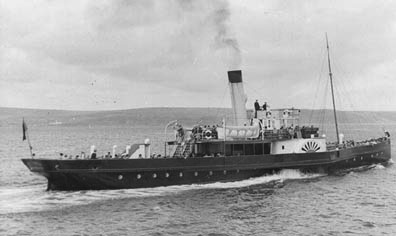
Season 1953
Extract from the Directors’ Report dated 8th March 1954
The Royal Naval Review at Spithead was a source of increased revenue for the Company, but the counter attractions of the Coronation celebrations in London and the bad weather in July materially reduced steamer earnings. On the whole, however, 1953 was better than the previous two seasons.
The Cold Storage Department is still controlled by the Ministry of Food but it is expected to revert to the Company this year when rationing ends.
Mr J M Ward the Marine Superintendent and Works Manager retired at the end of 1953 and a pension has been granted to him. His place has been taken by Mr D E Brookes who has served the Company as Assistant to Mr Ward for the last 7 years and the Directors have every confidence in his ability both as Marine Superintendent and Works Manager.
The shareholders will be aware of the unrest amongst the Workers in the Ship Repairing and Allied Trades and any increase in wages to meet their demands must necessarily increase the maintenance and running expenses of the Steamers.
Season 1954
Extract from the Directors’ Report dated 28th February 1955
The weather during the 1954 Season was almost the worst on record. Weather experts tell us it was the wettest Season since 1946, the coldest since 1920 and the least amount of sunshine since 1912. So far as the Company are concerned there were 13 blank days at Bournemouth and 49 trips had to be cancelled, whilst at Weymouth there were 8 blank days, 71 trips to Lulworth Cove had to be cancelled, and there were 14 days when no work could be carried out on the Weymouth beach. These were adverse factors which could not have been foreseen and, of course, seriously affected the Revenue from Excursion Services.
The cost of repairs and maintenance is still rising due mainly to the increase in Wages and Materials.
Every effort has been made to secure Contracts for our Works Department. During the past year this section was actively engaged on various Contracts etc which resulted in a reasonable profit which, however, was more than counter-balanced by the heavy loss of Revenue from the Steamers.
The manufacture of ice was discontinued in June and the accommodation made available has been reconstructed and equipped for additional Cold Storage which has added appreciably to our capacity. Since decontrol of the Cold Store by the Ministry of Food in December 1954, satisfactory arrangements have been made with Wholesale Meat Importers which should bring beneficial results for the Company.
Season 1955
Extract from the Directors’ Report dated 2nd March 1956
Although the weather during the 1955 Season from July onwards was the best experienced for several years, the working results of our steamer services were not as satisfactory as had been hoped, due mainly to heavily increased operating costs. Measures have, however, been taken which, with average weather conditions, give promise of better financial results for the forthcoming season.
Contracts secured for our Works Department during the early part of the year were few and it was not until October that the result of efforts made came to fruition. Since October the Works Department has been fully extended and we are particularly pleased to record the successful conclusion of negotiations with the British Transport Commission for a five year contract to undertake work in connection with the annual refit of their fleet stationed at Weymouth.
Increased Provisions handled in the Cold Store since May 1955 has fully justified the decision to convert the former ice making room into additional cold storage space. There is every reason to anticipate the volume of business being maintained and the Cold Store should continue to prove a profitable investment.
The PS Empress, which was built in 1879, having done yeoman service for the Company over a long period of years, was reluctantly sold to the Ship-breakers during the past season.
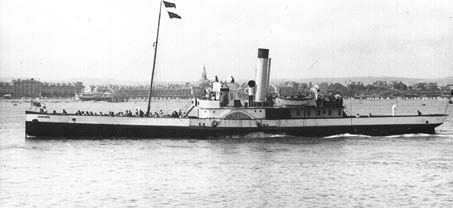
Season 1956
Extract from the Directors’ Report dated 2nd March 1957
With the high costs of preparing ships for a limited period of service, constantly increasing operating costs and having to depend upon weather conditions, it is becoming increasingly uncertain whether pleasure steamer services can any longer be operated remuneratively and the advisability of discontinuing them completely has been carefully considered. Assured, however, of the full cooperation of Bournemouth Corporation it has been decided to maintain services in 1957. They will, however, be restricted to the peak holiday months and two ships only, the Monarch and the Embassy will operate from Bournemouth. The Consul will operate for a further season from Weymouth. Following this decision the Emperor of India was sold in January 1957.
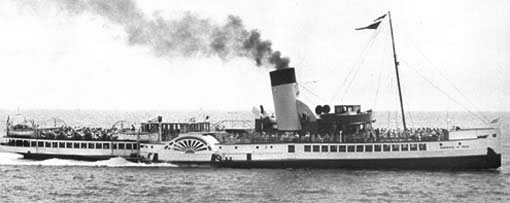
Season 1957
Extract from the Directors’ Report dated 1st March 1958
The Works Department and Cold Store had another satisfactory year and it is particularly pleasing to record that in spite of bad weather the steamer services also contributed to the Trading Profit. This was primarily due to the decision to operate two ships only, namely the Monarch and the Embassy, instead of three from Bournemouth and to restrict services to the peak holiday months.
The Directors recommend payment of a dividend of 10% less tax.
Season 1958
Extract from the Directors’ Report dated 2nd March 1959
Although the Works Department and Cold Store had another satisfactory year and produced reasonable profits, the Company’s steamer services were once again adversely affected by the exceptionally bad weather conditions experienced during the summer months. This unfortunately resulted in less profit being earned on the steamers and contributed largely to the reduction of £5,398 5s 6d in the overall Trading Profit.
Mr C J H Kaile retired as General Manager and Secretary of the Company after 56 years’ loyal and active service. As a result of this retirement, Mr D E Brookes has been appointed General Manager and Mr S S T Davis (formerly Assistant Secretary) has been appointed Secretary.
Season 1959
Extract from the Directors’ Report dated 1st March 1960
Although the weather during the 1959 Season was good and carryings by our Steamer services increased, the higher revenue was largely off-set by heavier repair/maintenance costs due to the incidence of load-line surveys.
The Directors recommend the payment of a Dividend of 10% less tax.
Season 1960
Extract from the Directors’ Report dated 1st March 1961
The activities of the Works Department and Cold Storage were maintained at a satisfactory level and both produced reasonable profits. The Company’s Steamer services, however, were again adversely affected by the exceptionally bad weather experienced during the summer months which contributed to the reduction in the overall Trading Profit. Your Directors have decided to further reduce the pleasure steamer services and, during the summer of 1961, the Embassy only will be stationed at Bournemouth. Following this decision the Monarch has been sold for break-up purposes.
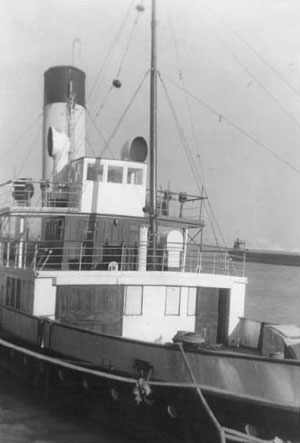
Season 1961
Extract from the Directors’ Report dated 23rd February 1962
The reduction in steamer services at Bournemouth during the summer of 1961 resulted in increased profit but, unfortunately, for the first time in many years, a loss occurred in the Works Department due to less ship repair work being undertaken*.
The activities of the Cold Store were maintained at a satisfactory level.
The overall results of the year are disappointing and your Directors do not recommend payment of a dividend.
[* A significant part of this was the arrival at Weymouth of the brand new Channel Island ferries Caesarea and Sarnia, which, being new, required no refit that year. As Cosens undertook much of this sort of work for the British Transport Commission at Weymouth this left a hole in their ship repair work that year. JM]
Season 1962
Extract from the Directors’ Report dated 1st March 1963
Small losses were experienced in the Cold Store and Works Department but economies are being effected and additional ship repair work is expected in 1963.
Consideration is being given to disposal of property surplus to the Company’s requirements and during the year the Head Office at Weymouth was transferred from Custom House Quay to 50 Commercial Road and the former premises sold.
The bad weather experienced during the summer season adversely affected the traffic carried by our steamers at Weymouth and Bournemouth. The Consul, built in 1896, will be withdrawn from further service and the operating programme for the Embassy at Bournemouth reviewed for the 1963 Season.
In view of the overall results of the year your Directors regret that they cannot recommend payment of a dividend.
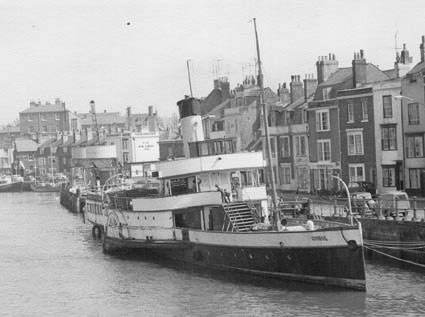
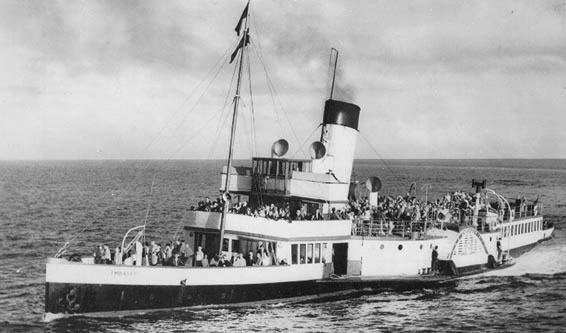
Cosens and Company continued to operate their last paddle steamer, Embassy, until 1966 after which she followed all the others to the scrap-yard in May of the following year.
The Directors’ reports well illustrate the difficulties of running paddle steamers which are expensive to maintain and operate and which produce revenue for only a few months each year. Costs ever escalated then as they do now. Wages go up. Ship repair costs go up. Stores go up. Everything goes up. And all this has to be financed from revenue or from somewhere.
But revenue is itself subject to many external factors outside the control of operators. Rival attractions, today including such seemingly unlikely things as Sunday Shopping and cheap European weekend breaks courtesy of Ryanair or Easyjet, may lure potential passengers away to other activities. The economic climate may discourage some from spending. Taking a paddle steamer trip may go out of fashion. And the weather, over which mere mortals have no control, may defeat everything. If you loose thirty days from Bournemouth or 60 trips to Lulworth Cove because it is too windy to use the pier or get into the Cove, as was the case for Cosens in 1951, then that revenue can never be got back.
Kingswear Castle is no less dependent on revenue than her long gone cousins but, as a registered charity, she is able to obtain funding from elsewhere. In the last decade the Heritage Lottery Fund, The City of Rochester Upon Medway Council, the Manifold Trust, the Paddle Steamer Preservation Society as well as many other organisations and countless individuals have all contributed in a multiplicity of ways to help finance major works on our steamer and keep the ship running. These sources were not available to Cosens.
After the sale of the Embassy and their withdrawal from paddle steamer operation, Cosens continued in business undertaking ship repair and general engineering work at Weymouth and latterly in new premises on the Isle of Portland until the early 1990s. The last Return for the Company was filed in August 1995 and Cosens and Company Ltd was dissolved on 25th September 2002, 124 years after its incorporation and 154 years after Capt Cosens first set up his paddle steamer business in 1848.
Kingswear Castle returned to service in 2023 after the first part of a major rebuild which is designed to set her up for the next 25 years running on the River Dart. The Paddle Steamer Kingswear Castle Trust is now fund raising for the second phase of the rebuild. You can read more about the rebuilds and how you can help if you can here.
John Megoran

